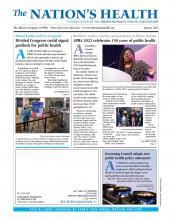Armed conflict continues to disrupt public health in countries around the world, and much work is needed to end the damage to lives and health systems, according to experts who spoke at APHA’s 2022 Annual Meeting and Expo.
During the last three decades, “political violence has become more frequent, more complex and has affected more people,” said Cindy Sousa, PhD, MSW, MPH, associate professor of social work at Bryn Mawr College.
In 2019, global political violence forced “nearly 80 million people to flee their homes or countries as internally displaced persons or refugees,” said Sousa, an APHA member. One-fourth of the world’s population live in a region of armed conflict.
Since it began in February, the war in Ukraine has caused at least 16,300 civilian casualties through October, according to the Office of the U.N. High Commissioner for Human Rights, with about 6,400 people killed and 9,900 injured. Health services have also been damaged and disrupted.
From February to November, 645 Russian attacks have targeted health services, according to the World Health Organization. In a video appearance during APHA 2022’s opening session, Viktor Liashko, MD, MPA, Ukraine’s minister of health care, said 29 health workers had been killed and 66 seriously injured during the first nine months of the invasion.

A man and child stand in the devastated city of Irpin, Ukraine, in March after Russian attacks. Calls for an international tribunal to hold Russian soldiers and top Moscow officials accountable for atrocities in Ukraine are mounting.
Photo by Aris Messinis, courtesy AFP/Getty Images
“Russia is not only waging an unjustified and brutal war, it creates the conditions for real disasters in the field of public health,” Liashko said.
Globally from 2016 to 2021, nearly 5,000 incidents of violence against health care workers in war zones have been reported, according to the Safeguarding Health in Conflict Coalition. More than 970 hospitals were damaged and destroyed.
Ongoing conflicts in Myanmar, Yemini, Ethiopia and Haiti have resulted in deaths, destruction and collapse of health care services. Ethiopia is suffering from the impacts of a civil war in its Tigray region, which has killed over half a million soldiers and civilians, including 19 aid workers and 22 health workers in 2021 alone. Three workers with Doctors Without Borders were killed while rendering aid in Ethiopia in March.
Ella Watson-Stryker, MPH, MIA, a humanitarian representative of Doctors Without Borders, said the organization faces numerous barriers in war zones, from artillery fire to political bureaucracy.
Though international laws exist to protect aid workers, the laws are often ignored, Watson-Stryker said. Governments can also be untrustworthy and aid workers relegated to negotiating with armed combatants in embattled regions.

An Ethiopian woman cries as she and others are displaced from their homes due to Ethiopia’s civil war in the Tigray region. The war has killed over half a million soldiers and civilians, including 19 aid workers and 22 health workers in 2021 alone.
Photo by J. Countess, courtesy Getty Images
“It should not be a death sentence to choose to be a doctor in a war zone,” Watson-Stryker said.
Palestinians living in the Gaza Strip and West Bank, which Israel’s military has occupied for more than half a century, lack an adequate public health system, said Yara Asi, PhD, assistant professor at the School of Global Health Management and Informatics at the University of Central Florida.
Political violence between Israel and the Palestinians causes conditions that severely damage care, Asi said. Because Palestinian territories have such poor health care, residents are often referred to better-equipped Israeli health centers. But obtaining a travel permit to Israel is nearly impossible, unleashing a blizzard of paperwork and biased investigations, she said.
“Structural violence can take many forms,” said Asi, an APHA member. “Movement restrictions are significant barriers to health care provision, from training to receiving treatment. Freedom of movement is a fundamental human right, and should be considered a social determinant of health.”
Experts say accountability is needed to break the pattern of violence, and holding Russia accountable for war crimes in Ukraine has become a rallying call for many.
The Ukrainian Healthcare Center is investigating Russia’s health care attacks, taking photos and collecting evidence on the ground to build a case for international courts, said Leonard Rubenstein, JD, MA, a professor of human ethics at Johns Hopkins University’s Bloomberg School of Public Health. Russian health care attacks are also being investigated by the Humanitarian Research Lab at Yale School of Public Health, focusing on satellite data as evidence, and by a United Nations commission of inquiry.
“Ukraine provides an opportunity for accountability, which has been missing (in other cases involving human rights violations),” said Rubenstein, an APHA member. “And we need accountability if we’re ever going to say, ‘Perpetrators, there are going to be consequences if you do this. If we capture you, we’re going to send you to prison for these war crimes.’”
APHA supports prosecution of humanitarian violations and war crimes, and honors those who fight for peace and justice. At APHA 2022, Mulugeta Gebregziabher, PhD, a professor of biostatistics at the Medical University of South Carolina, was honored with the Victor Sidel and Barry Levy Award for Peace for helping reveal the Ethiopian government’s human rights violations against residents of the country’s Tigray region.
For more information, visit Human Rights Watch at www.hrw.org.
Melanie Padgett Powers contributed to this article. Some of this information was published on Public Health Newswire’s Annual Meeting Blog.
- Copyright The Nation’s Health, American Public Health Association









